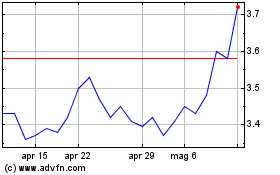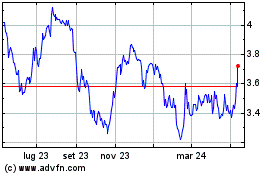By Katie Deighton
Tom Szaky, the chief executive and founder of TerraCycle,
imagines a world where shoppers take their trash with them to the
grocery store.
In his vision, people purchase products like ice cream and
deodorant in reusable containers. At the cashier, they pay an
additional cost: a refundable packaging deposit. They return empty
containers to the store, which collects them for cleaning and
reuse.
The consumer gets each deposit back and buys another tub of ice
cream or stick of deodorant from the shelf. The cycle starts
again.
Soon Mr. Szaky is going to find out if his idea can work in the
real world.
Retailers including Kroger Co. next year plan to make space in
stores for Loop, TerraCycle's refillable packaging platform. Tesco
PLC in the U.K. and Carrefour SA in France also are planning to
install in-store Loop "corners" -- areas of a store designed for
products packaged in Loop's containers -- in the next 12 months.
Loblaws Inc. in Canada and Woolworths Group Ltd. in Australia will
bring Loop stations to stores sometime in 2022, a Loop
representative said.
Aeon Co., Japan's largest supermarket group, plans to introduce
Loop corners to 16 stores in the greater Tokyo area next March.
"We want people to come in and fall in love with these really
cute, beautiful packages, understand the message and get excited
about it," said Satoshi Morikiyo, general manager of convenience
goods at Aeon. "Shopping trips are not necessarily something people
look forward to, but this is a cool experience that offers
something of a discovery -- something new and fun."
TerraCycle, founded by Mr. Szaky in 2001, offers companies
services such as programs for hard-to-recycle waste that would
otherwise end up in landfill sites.
TerraCycle introduced Loop in May 2019. The division provides
brands from consumer packaged goods giants like Procter &
Gamble Co. -- also an investor in Loop -- with durable packaging
designed for reuse rather than recycling. Other investors include
Suez, Aptar and Sky Ocean Ventures.
Household products like Häagen-Dazs ice cream and Seventh
Generation detergent, for example, are sold in stainless steel tins
designed by Loop to be returned, cleaned and sold again in a
"milkman" style system. The refundable packaging deposit customers
pay ranges from $1 to $10, depending on the container's size and
material.
The company has developed reusable packaging for 400 products,
but so far sold them only through the internet to consumers in
parts of the U.S., France and the U.K.
As retailers prepare to bring Loop into stores, executives are
trying to craft a shopping experience around the products rather
than simply stacking them on shelves.
Some chains are moving cautiously. Walgreens Boots Alliance Inc.
has been working with Loop on an e-commerce pilot in 15 states and
Washington, D.C., since May 2019. It is still monitoring results
and gathering feedback, according to Lauren Brindley, group vice
president for beauty and personal care at Walgreens. It hasn't set
a date for an in-store launch.
"We have to really consider how we make sure customers
understand from the beginning what they're purchasing, and how they
basically get the deposit back for the product," Ms. Brindley
said.
Kroger, another of Loop's founding partners in the U.S., is on
track to test a Loop retail experience in a handful of stores in
the first quarter of 2021, according to Lisa Zwack, the company's
head of sustainability.
The chain is designing a retail experience that is easy to find
in store and compels customers to reach out and touch the products,
Ms. Zwack said.
In Aeon's first Tokyo stores to introduce the program, a Loop
employee will stand at each station to explain the system and field
customer questions, Mr. Morikiyo said.
Products will appear on Loop-branded shelving, with packaging
that Aeon deems particularly attractive highlighted on
pedestals.
"The Japanese customer loves packaging and really pride
themselves on beauty, innovation and design," Aeon's Mr. Morikiyo
said. "We're envisioning people taking selfies or photos in the
Loop corner."
To collect used containers in stores, Loop has developed two
types of receptacle: the "smart" bin, which can scan empty
containers and refund deposits right away, and the analog "passive"
bin, which sends refunds to customers' bank accounts once their
deposit has made it to a central Loop cleaning center.
Loop also has deals in place to put stations in a number of
smaller locations, such as the boutiques of a cosmetics brand and
outlets of a British fast-food chain, Mr. Szaky said. The long-term
plan calls for customers to be able to buy Loop products at one
store and return the empty packages at another, he said.
Loop will work closely with each retailer on the store
experience in the beginning, but plans to give stores more
flexibility as its outposts spread, Mr. Szaky said.
"Our goal is to eventually allow these brands and retailers to
play in the platform however they want," he said. "But until it's
really working perfectly, we want to be involved in sharing
knowledge between retailers."
Write to Katie Deighton at katie.deighton@wsj.com
(END) Dow Jones Newswires
August 17, 2020 16:57 ET (20:57 GMT)
Copyright (c) 2020 Dow Jones & Company, Inc.
Grafico Azioni Carrefour (PK) (USOTC:CRRFY)
Storico
Da Nov 2024 a Dic 2024

Grafico Azioni Carrefour (PK) (USOTC:CRRFY)
Storico
Da Dic 2023 a Dic 2024
